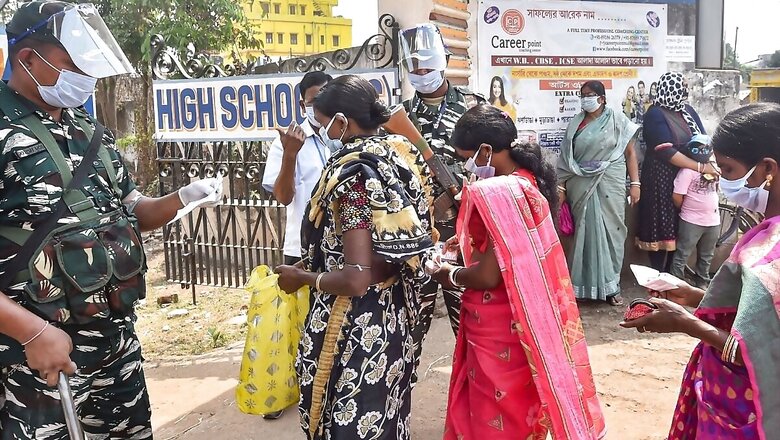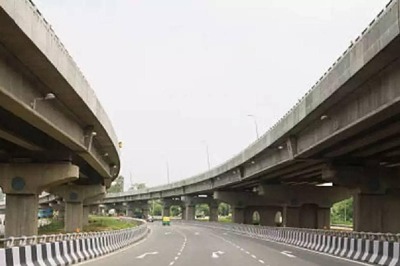
views
Bengal has always been a violent state and Tamil Nadu has had a history of misogynist politics. However, the recent events of slurs and violence against women may see a shift in voting patterns in favour of the BJP and its allies in both states.
The DMK has had a history of misogyny—so much so that MGR and Jayalalithaa used it to their advantage to keep the AIADMK in power for most of its existence since it broke away from the DMK. This started with MGR coining the phrase “Thaai-Kulam” to refer to women, which would roughly translate into Mata Kul in Hindi or the Family of Mothers in English. That simple coinage followed up by policies to empower women was enough for MGR to gain a solid voter base amongst women even in families where the men would tend to vote for the DMK.
This base was solidified under Jayalalithaa when the DMK physically assaulted her and tore her clothes in the Tamil Nadu Assembly, propelling her to become the chief minister with a thumping majority. The cumulative effect of a slew of pro-women policies was that MGR had an almost continuous rule as the chief minister, completely excluding the DMK from power while he was alive. With Jayalalithaa, this female vote bank was more capricious given the outrageous corruption and excesses of her first term. But ultimately, it solidified behind her—in 2016, she won a consecutive second term with a significant majority, defying not just all pollsters but also the pendulumic nature of Tamil Nadu politics since the death of MGR.
DMK & Misogynistic Remarks
Given this history, one would have expected the DMK to be more careful about what its leaders said in public? Alas, not. It started in January with Stalin’s son Udhayanidhi making misogynist remarks; followed by Dindigul Leoni making some more sexist remarks; still worse, with party deputy general secretary A. Raja making more such remarks; and it has now culminated with Dayanidhi Maran (Stalin’s relative, brother of the owner of Sun TV, and a Harvard Graduate) making probably the worst statements on record in this campaign to date. Stalin’s call to his party colleagues to “maintain dignity” seems to have been largely ignored. Indeed these four seem to have got away unpunished in the public eye given that just two years ago the DMK had suspended popular yesteryear actor Radha Ravi for making similar remarks.
ALSO READ| Tamil Nadu Polls: Facing Acid Test, Will Palaniswami and AIADMK Crawl Or Soar?
The AIADMK, for its part, has gone to town with these remarks—and the cumulative effect of such statements coming in rapid succession cannot be underestimated. Chief Minister Edappadi Palaniswami or EPS used A. Raja’s remarks against him to great effect, welling up at a public rally. The question though still remains how exactly will this affect the electoral calculus?
The AIADMK after 10 continuous years in power is reeling from anti-incumbency. However, the anger does not seem to be much, given the exemplary way in which the AIADMK provided for the people during lockdown. Jayalalithaa’s chain of Amma kitchens formed the backbone of a cooked food distribution network, which was leveraged to great effect during the lockdown and not to mention having a well thought out lockdown policy.
Whatever residual anti-incumbency exists also seems to be alleviated by the presence of Narendra Modi campaigning in Tamil Nadu, the BJP seemingly untouched by whatever baggage its alliance partner, the AIADMK, may carry. Modi already enjoys a pro-woman image given that his flagship schemes—be it electricity and piped water to houses or building toilets—have disproportionately alleviated problems that women faced. The female face of the BJP is Khushbu Sundar, once Tamil Nadu’s top female actor, who has been running a high impact, local connect campaign with women in the Thousand Lights constituency, normally a DMK bastion. Similarly ex-bureaucrat turned high profile BJP politician, K. Annamalai, has also been talking up women’s issues. It remains to be seen what this well of goodwill for the BJP translates into on the ground for the NDA and how much it alleviates the AIADMK’s baggage.
Bengal & Systemic violence
In Bengal, the hornet’s nest was stirred up by Mamata Banerjee herself. The shift to Nandigram was seen on the ground as a panic reaction—wanting to return to her heydays, the campaign against the Tata Nano factory that brought her to power. The problem is even before rumours of panic were laid to rest, she claimed to have been attacked by thugs, injuring her foot. Unfortunately for her, her own police force refused to back her version of events claiming she had been injured during an accident. This has further reinforced the notion—whether rightly or wrongly—of desperation and panic in the TMC ranks.
ALSO READ| Game on in Bengal: As BJP Sets Attacking Field, Mamata Must Play Captain’s Knock to Win Test
The problem for the TMC is that while this could be seen as a Jayalalithaaesque attempt at playing the injured woman card, goons allegedly from her party brutally beating up an 85-year-old lady by the name of Shova Majumdar (who has now died) has boomeranged badly on the TMC and Mamata’s aggrieved woman card. Furthermore, a rather interesting report shows a significant consolidation of the SC and ST communities behind the BJP, presumably because being the most economically vulnerable they are also the most exposed to Bengal’s systemic violence. To note is the fact that this SC-ST consolidation is happening in areas where the Muslim population’s figures are the highest—further cutting into the TMC vote bank, and positing the BJP as diametrically opposite to the TMC in law and order terms.
One does, however, need to be careful. Parachuting in a number of Delhi-based “probashi” Bengalis onto a local election has also alienated some within the BJP fold. But this again has two sides to the story. On the one hand, it can be argued that they have displaced local candidates, on the other, it can be seen as a commitment by the BJP to break clean of Bengal’s endemic violence and social control, exercised through clubs (padas) and local thuggery.
The going isn’t easy for the BJP (and its allies) in Bengal and Tamil Nadu. The big question is will misogyny neutralise the anti-incumbency of the BJP allies and trump caste equations in Tamil Nadu? Will violence against women and the SC-ST communities overcome entrenched local interests to propel the BJP to victory in Bengal? May 2 will give us the answers.
Read all the Latest News, Breaking News and Coronavirus News here. Follow us on Facebook, Twitter and Telegram.



















Comments
0 comment